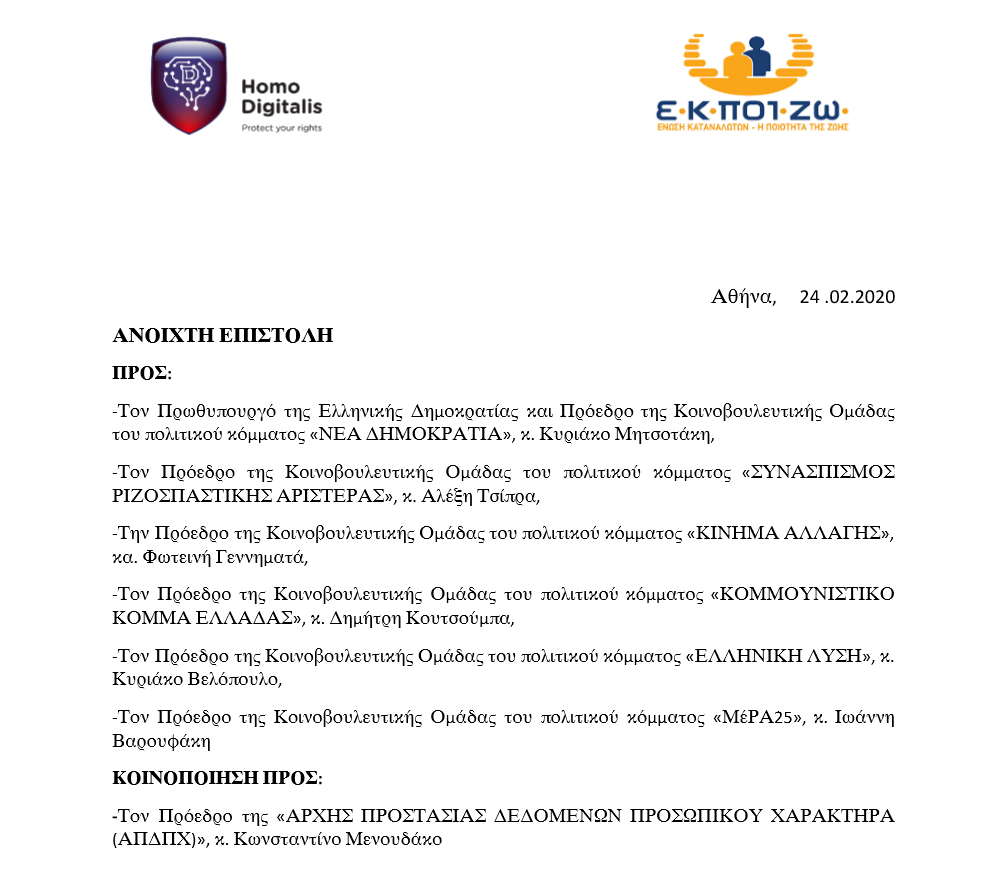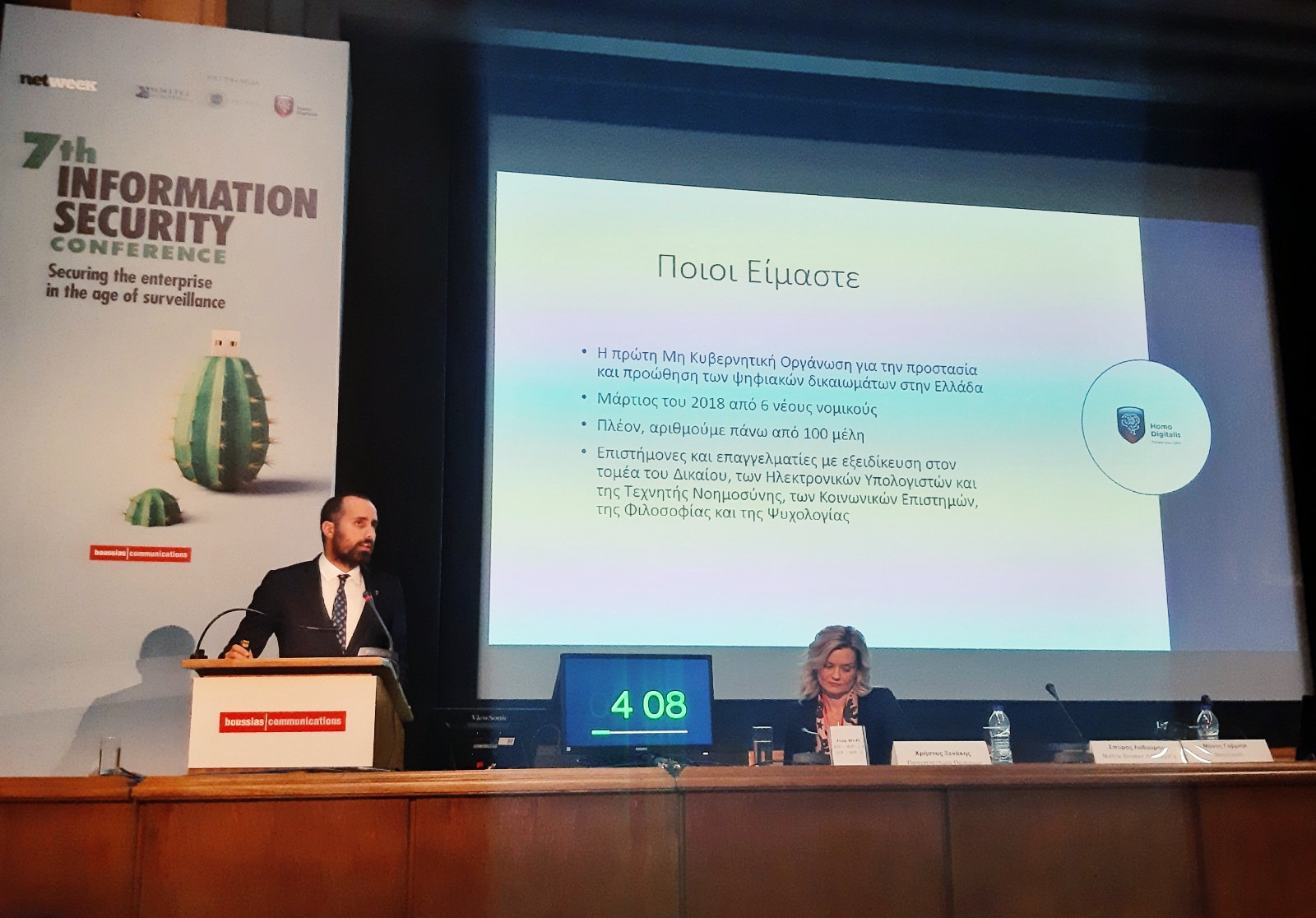Homo Digitalis at 4th Data Protection & Privacy Law Forum
The 4th Law Forum on Data Protection & Privacy took place in Athens on February 26, 2020.
The conference was organized by Palladian Conferences with the support of Homo Digitalis.
Stefanos Vitoratos, vice-president of our organization, represented Homo Digitalis, speaking about the importance of raising awareness of the public in order for data controllers to achieve compliance.
Maria-Alexandra Papoutsi, Vasilis Vasilopoulos and Dimitris Patsos, also members of our organization, participated at the conference, under their professional capacities.

Call to Greek political parties: Reconsideration of the Data Protection Law
On February 24, Homo Digitalis and “EKPIZO” Consumers’ Union sent a joint letter to the Greek Prime Minister and all leaders of the parliamentary political parties, requesting the immediate reconsideration of Law 4624/2019 on data protection.
The necessity for such a reconsideration stems from the Opinion 1/2020, issued by the Greek Data Protection Authority, which found Law 4264/2019 to be in contravention with the GDPR and Directive 2016/680 on various occasions.
The letter was also communicated to the President of the Greek Data Protection Authority, Mr. Konstantinos Menoudakos.
You may read the letter in Greek here.
Homo Digitalis participates in Digital Freedom Fund events
Our organization had the great honour to participate in the strategy meeting and legal actions event on Artificial Intelligence organized by the Digital Freedom Fund on 19-21 February.
We had the chance to meet old fellows and connect with new companions with a view to making new collaborations. Organizations from many countries took part in the events, while Homo Digitalis was the only representative of Greece.
We warmly thank the Digital Freedom Fund for the invitation. It was a pleasure!
Homo Digitalis in the 7th Information Security Conference
On 19 February 2020 the 7th Information Security Conference took place in Evgenidis Foundation in Athens.
The conference was organized by Boussias Communications and with the support of Homo Digitalis.
Mr. Konstantinos Kakavoulis represented our organization, speaking about the importance of information security in our culture. Mr. Kakavoulis underlined that “cybersecure at home means cybersecure at work.”
Three more Homo Digitalis members attended the conference.

Homo Digitalis educates the teachers in Chania
On 14 February Homo Digitalis was invited to speak to the teachers of primary and secondary education in Chania, Crete.
In the morning session, Elpida Vamvaka and Konstantinos Kakavoulis spoke to the teachers regarding the digital footprint and its importance for our digital personality.
They explained in a practical way how the teachers can protect themselves, but also how they can educate their students to gain control of their personal data.

In the afternoon session, they spoke to parents and children regarding the right to access and the right to erasure.


Two more Homo digitalis members participated in the seminar, with Anthi Strataki and Dimitris Grammenos, presenting the interactive workshop “GDPR and the 40 thieves”, while Giorgos Perrakis, lawyer and Homo Digitalis member, attended the seminar.

Homo Digitalis starts its collaboration with Sarantaporo.gr
Homo Digitalis and Sarantaporo.gr, the most active wireless communicty network of citizens in Greece, proudly announce their collaboration.
Their common activity shall be directed to the promotion and protection of digital rights, particularly the right to access to internet, in remote areas.

Stefanos Vitoratos and Vassilis Chryssos signing the Memorandum of Understanding for Homo Digitalis and Sarantaporo.gr
According to a recent survey, only 78,5% of Greeks have access to the internet, thus meaning that 2,5 million citizens live digitally excluded.
This partially comes as a result of the fact that the level of internet service is low, in remote areas with small population; these areas remain excluded because there is no interest by the internet service providers to invest there.
Sarantaporo.gr is a wireless community network working towards the elimination of this digital exclusion. It operates in 11 villages in the area of the Elassona Municipality, providing internet access to 3,500 people. Its operation is based on the participation of the internet users in the creation and maintenance of the network.
This project recently won the first prize in the European Broadband Awards 2019 by the European Commission.
The two prominent civil society organizations decided to work together to propose measures to the Greek State, which shall enhance the level of internet access and provide for actual enjoyment of digital rights for the people residing in the Greek territory.

The members of the two organizations during the signature of the MoU
Homo Digitalis on ΣΚΑΙ Crete 92,1
Elpida Vamvaka, president of Homo Digitalis, spoke to ΣΚΑΙ Crete 92,1 radio station for Personal Data Protection matters in the context of the events that took place last week on Heraklion. You can listen on the interview by clicking on the following link: https://www.youtube.com/watch?v=9mtDAvFPUy4&feature=youtu.be
During the interview, the next event to take place in Crete was announced which will be hosted by the Directorates of Primary and Secondary Education of Chania in collaboration with the Foundation For Research And Technology (FORTH) and Homo Digitalis on Friday 14 February 2020, titled “Personal Data Protection and student security in the digital world”.
Further details will be announced the following days
Homo Digitalis on ΚΡΗΤΗ TV
Homo Digitalis President, Elpida Vamvaka and Homo Digitalis member and DPO of FORTH, Anthi Strataki, talked to ΚΡΗΤΗ Today show on ΚΡΗΤΗ TV for Personal Data Protection matters, on the occasion of the recent events that took place last week on Heraklion. You can view the interview by clicking on the link: https://www.youtube.com/watch?v=2IQhH_rQrJY
During the interview, the next event to take place in Crete was announced which will be hosted by the Directorates of Primary and Secondary Education of Chania in collaboration with the Foundation For Research And Technology (FORTH) and Homo Digitalis on Friday 14 February 2020, titled “Personal Data Protection and student security in the digital world”.
Further details will be announced the following days.
Homo Digitalis distributed cookies "for free" in Heraklio, Crete
In the context of the Data Protection Day, the Homo Digitalis team distributed cookies to passers-by in the central square of Heraklion, Crete, on 30 January 2020.
The cookies were distributed “for free” in exchange for the personal data of the passers-by. Only 2% of them did not accept to exchange their personal data with cookies!
This action intended to explain in a simple way the operation of cookies online.
The event took place under the auspices of the District of Crete, to which we are grateful.
Local media covered the event and many interviews were given by our members.
You can read the story in Greek at cretalive.gr and watch videos for Kriti TV and Creta Channel.








